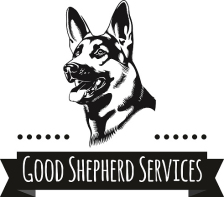Starting a Prison Dog Program
A good Prison Dogs Training Program benefits the dogs, the offenders, the institution, your community and everyone involved.
We know this looks long, so let us say upfront that we do NOT want to discourage you from pursuing a “Prison Dog Program”. The best way to make it a reality is to be aware of what’s involved so you can address the issues. We hope the following will answer some of the questions you have.
To start a program, there must be a
sincere focus on:
improving the lives of dogs, helping the disabled community and rehabilitating the Incarcerated.
In our society an incarcerated person is a thrown away person because they did something wrong, the abandoned and unwanted dog is a throw away dog, sometimes for doing something wrong, this creates a symbiotic relationship between the incarcerated and the dog. The Incarcerated learn skills to teach dogs to become ‘good citizens’ in the community and this is exactly what the incarcerated will be doing with their own lives; learning how to be good citizens.
Some benefits are known but not always talked about since many incarcerated people are not into any kind of structured ‘therapy’ but the dogs bring healing, they help build damaged self- esteem, they make hearts happy, and when that happens, the dogs help break down barriers so the incarcerated can be receptive of other people, programs and of what will help their life become better. The dogs in the institutions can really make a major difference in the life of the incarcerated and the institution; the dog becomes a “tool for change”.
1) You MUST be totally committed to the effort. It is not a part-time endeavor. Your organization must be available to support the effort 24 hours a day, 7 days a week, every single day of the year. Puppies and dogs get ill or injured at the most inopportune times, and most institutions are not equipped to handle ‘dog emergencies.’
2) You should have a clear plan before you initiate contact with the institution.
As an example:
- What exactly is it you want to accomplish? (Determine what type of program are you going to have; Rescue/Re-home or Service or both?
- Why should the prison be involved?
- What makes YOUR organization qualified to take on this project? (Are you a 501c3 organization? If not, do you have one that is willing to work with you? An animal shelter, humane society, dog rescue or service dog school would be some options)
- Who will train your offender-trainers, and who will evaluate their progress? (You’ll need qualified trainer(s). We have developed a complete manual which includes a training course developed for the inmates and much more, please see information at the end of this notice.)
- If your organization is going to manage the program, what assurances can you give that you will be able to sustain it?
- Who will pay for the program – all the crates, training equipment, food, vet bills, emergency vet bills, medications, transportation, trainers, etc?
- Where will you get the dogs, who will evaluate them prior to bringing them in the facility to reduce the chance of injuries to staff, offenders, and animals?
- Is the facility air-conditioned? Dogs don’t cool themselves as efficiently as humans, so how will you ensure their safety in the summertime?
- You need a great business plan to convince the prison of your sincerity and your ability to perform.
3) You MUST have the right staff and/or volunteers. I can’t say enough about this one; somebody has to train the offenders on how to train the dogs, whether you’re interested in training service dogs or nice pets. These people are critical. They must not only be exceptional trainers, able to successfully pass their expertise to others, they must also be exceptional communicators able to read and understand human body language as well as canine. And since they won’t be on-site all the time, they need to be able to read through the dogs’ body language. Dogs don’t lie, and your staff needs to be exceptional at understanding what they are trying to tell us.
Your staff and volunteers will be working in a unique environment, with people whose life experiences are probably quite different than what they are familiar with. This is not a working environment that will suit everyone. They must be level-headed, able to understand and follow all the rules, and able to interact with the offenders appropriately. They need to be respectful of, and able to work well with prison staff. They need a boatload of common sense. Remember that the people you choose are not only there to help the offenders learn to train a dog, but they are modeling behaviors for success out in the community.
You will meet some good people who happen to be incarcerated. You will also encounter people who excel at manipulating other people, it’s what they do, and they are very good at it. You will meet people with an incredible amount of emotional baggage, as well as people who live to “stir the pot” or have destructive or self-destructive tendencies. Leaders, followers, instigators, and everything in between. Your staff and volunteers must be able to treat all of the offenders fairly and respectfully. Your staff also needs to be aware of, and able to pick up on subtle indicators to ensure the safety and success of your dogs and your program. The qualities required to grow and develop as a good dog trainer often run contrary to many of the unspoken rules in the prison environment. Even the good people that you find will need time to adjust to the idea of opening up, and trusting that you really do mean what you say. Your staff must be patient, trustworthy, and unscrupulously fair in dealing with the offender-trainers.
You need continuity in your staff, you’ll need the same core group of people involved on a regular basis, to keep close track of canine and human training progress and also to detect any trends or changes in group dynamics. You must know and follow the prison’s rules and requirements, and ensure every staff member or volunteer complies.
4) You must have the support of the prison staff, from the state-level Department of Corrections. Warden, Superintendent, Corrections Officers and Caseworkers. Many people will welcome this type of program and see the incredible win-win possibilities for the prison, the offenders, and the greater community. Others will mainly see the potential negatives; increased security risks, potential dog bites, wondering if offenders might train the dogs to attack Correction Officers or other offenders, concern about treating one group of offenders differently than others, more paperwork, extra work, etc. All of these issues are valid, and need to be discussed and addressed in the policies you and the prison develop.
Are you able to adjust your training style and techniques to work within the confines of a prison? Is the prison willing to consider adjusting its policies, as long as safety and security issues are not compromised? You need the support of administration personnel AND the people who will work with the offender trainers on a daily basis the Housing Unit Supervisors, Caseworkers & Corrections Officers. These people are critical to the success of your program. You need to be sensitive to how the program will impact people’s jobs and responsibilities, and be prepared to do formal and informal presentations on your program.
Here is where you need to be a Public Relations expert!
5) You must be prepared to work with the prison to think through potential concerns, and develop clear written policies for EVERYTHING related to the program; care, feeding, cleaning, training, exercise, interaction with other offenders and staff, infractions, emergencies, etc. And, of course, you need to be professional in everything you do.
6) Remember this can and likely will be a long process, often frustrating but well worth it in the end.
A manual is available that will help you begin and operate a Prison Dog Program. From documents to get started to dog training theory, practical basic through advanced service tasks & service dog placement.
This manual is FREE to QUALIFING NONPROFIT ORGANIZATIONS who are planning to start a program or are looking to change their existing program.
This is also available to FOR PROFIT businesses that are planning or running a Prison Dog Program.
Please contact us for additional information.
Our manual includes solutions to many of the issues above and includes the following modules:
- Getting Started – Includes various information needed to start a prison dog program including sample MOU/Agreements and several articles on other successful programs.
- Forms –Adoption application, Volunteer agreement, Inmate Interview questions, Inmate contract sample, Inmate job description sample, Board letter sample, Dog Intake Record.
- Marketing- A few marketing ideas to help your organization with fundraising.
- Basic Training – The “Basic Training” manual includes detailed theory and training fundimental on items like; Language of Dogs, Social Styles of dogs and humans, Operant Conditioning, Canine Motivators, Leadership, Clicker Training, Grooming, Potty Training, settling in with a new dog, training terminology, basic obedience commands and more.
- Service Dog Training – This includes all the task work necessary to train the dog for disabled assistance, psychiatric issues etc. This includes retrieval, opening/closing doors/cupboards, bracing for stability, turning lights on/off, anchor/circle for Autistic response. This module also includes an in-depth manual for placement training to be used with the client/recipient of the service dog.
The entire manual (except “Getting Started” module) can be customized to your program including logos, name etc. You have permission to edit, add, omit as you see fit. You will receive working documents in Microsoft Word format via email or CD, USB Flash Drive.
Please contact Donna for additional informaiton:
951-255-0302 or donna@bpofcourage.org




